According to an analysis of the texts and images carried out by the consultants and executives of the MENFP on the works of Liv Inik, specifically, “the presence of the male gender is four and a half times more than that of the female”
The “Liv Inik an kreyòl” presented in February 2023 by the Ministry of National Education and Vocational Training (MENFP) contain various sexist depictions, according to a manager at the MENFP who participated in the analysis of the texts and images on the titles by « Liv Inik ».
These unique learning materials for the first and second grade bring together five basic subjects from the school curriculum: mathematics, Creole, French (oral communication), social studies, and experimental sciences.
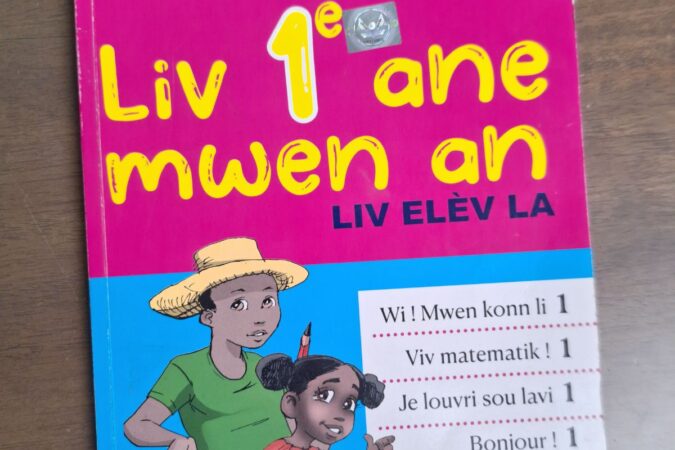
The “Liv Inik an kreyòl” presented in February 2023 by the Ministry of National Education and Vocational Training (MENFP) contain various sexist depictions, says a manager at the MENFP. ©Wilson Saintelus
Its adoption, according to officials, aims to harmonize the learning, skills, and cultures taught to children in their mother tongue and curb the disparity in the transmission of knowledge.
However, a preliminary and non-public report from the MENFP exclusively obtained by AyiboPost on the integration of gender equality into school curricula in Haiti, dating from December 2023, shows that the unique works as well as other textbooks used in teaching is full of stereotypes.
Textbooks are educational tools which, beyond transmitting knowledge, also serve to convey a global understanding of history, the rules of a society, as well as social norms.
Yves Roblin, former technical director at the MENFP, specialist in educational planning and management, believes that “these are essential determinants of the quality of education”.
A well-developed textbook allows learners to acquire sound knowledge, he adds.
These [textbooks] are produced by seven distinct publishers: Édition Zémès, Kopivit L’Action Sociale, C3 Éditions, Édition Pédagogie Nouvelle, Maison Henri Deschamps, Imprimerie Éditions des Antilles, and Éditions Université Caraïbe. AyiboPost has not independently analyzed these books. It is unclear whether all editions are affected.
According to the analysis of the texts and images carried out by the consultants and executives of the MENFP on the « Liv Inik, » specifically, “the presence of the male gender is four and a half times higher than that of the female”.
“We’ve assessed how well « Liv Inik » titles take gender into account, but nothing has changed,” explains Amente Désinor, head of the ministry’s Gender Focal Point.
In a copy of the Maisons Henri Deschamps edition of « Liv Inik, » titled « Liv 1e ane mwen an, Liv elèv la (My 1st year textbook, The student handbook), » presenting a lesson on the heroes of national independence, we can observe that all the characters are men.
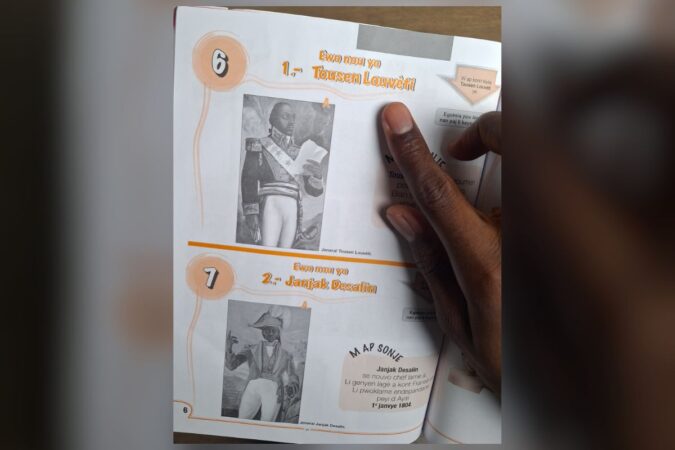
« My 1st year textbook, The student handbook, » presenting a lesson about the heroes of national independence.
The figures of Jean-Jacques Dessalines and Toussaint Louverture are in the foreground.
The 106 preschool, elementary, and secondary school textbooks evaluated by the MENFP come from three publishing houses [the most renowned in the country], whose names have not been revealed.
These editions are also among the most used by educational establishments.
The main findings about textbooks are that the male gender is overly represented compared to the female gender in books, gender roles, and so on.
For subjects relating to the social sciences and history, males are seven times more represented than females.
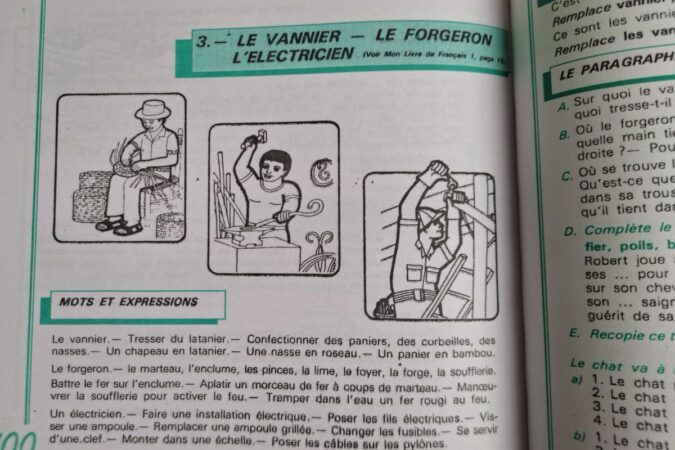
The representation of men in professional roles.
The MENFP report, which also takes into account the fight against gender-based violence, emphasizes that most textbooks are full of sexist stereotypes towards women and girls, often relegated to domestic work.
Certain professions, sports, and games such as: doctors, school principals, football, are reserved for men. While women are represented as traders, secretaries, nurses, or housekeepers.
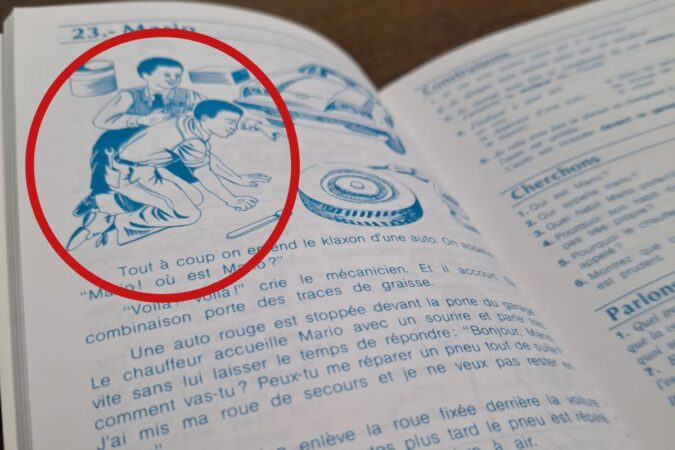
The representation of men in professional roles.
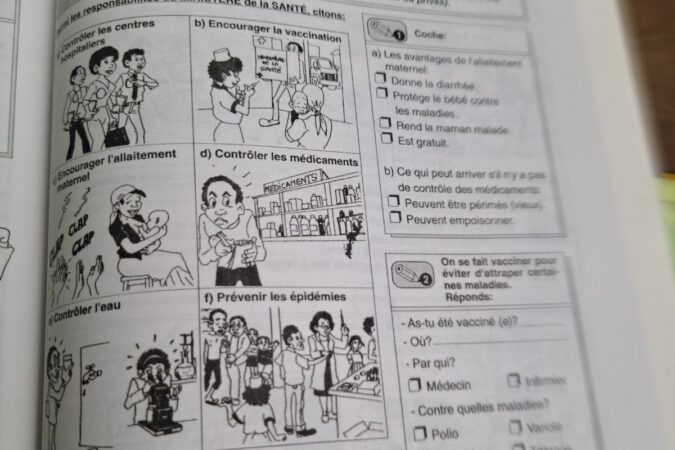
The representation of men in professional roles.
There is also the underrepresentation of women, gender disparity, and other forms of exclusion.
AyiboPost examined around 10 books on reading, grammar, civics, etc., published by several publishing houses, including Henri Deschamps.
Among others, titles include: « La rencontre de la grammaire, » « Moi mes droits et mes devoirs, » « Nous les enfants d’aujourd’hui, » « Mon 1ᵉʳ livre d’orthographe » et « Mon vocabulaire / Livre 1 ».
In the manual « Nous les enfants d’aujourd’hui, » a lesson from the tenth page of the book on the notion of “respect” depicts a scene of a mother reprimanding her son, refusing to obey.
We can read: “Toto spills a bowl of milk. – Take a cloth and come and wipe the package, his mother said to him. – No ! Don’t bother me. Clean it yourself.”
For educator Jacques Michel Gourgues who assessed this sequence, it expresses “a reluctance from the child in the face of the authority figure embodied by the mother”.
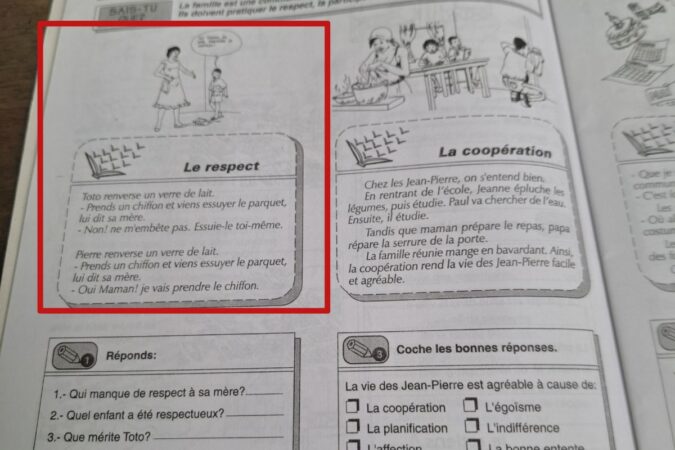
In the manual « Nous les enfants d’aujourd’hui, » a lesson presented on the tenth page of the book on the notion of “respect” depicts a scene of a mother reprimanding her son, refusing him to obey.
According to him, the scene implies that if it were the father, the child would have obeyed.
A representation of authority traditionally embodied by the father figure who ensures the role of transmitting rules to the child in a home.
On the right, an image illustrates the notion of “cooperation” in a family.
In the image, it is clearly visible that the mother is cooking and the father is repairing a lock on a door in the house.
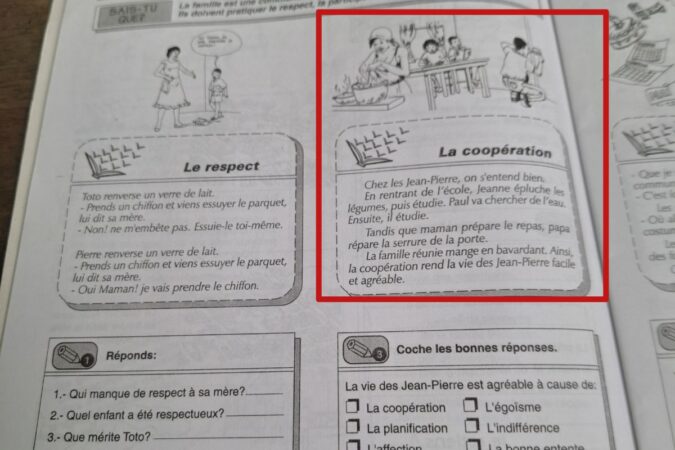
The mother cooking and the father repairing the lock on a door in the house.
As captions for this illustration, we can read: “At the Jean-Pierre’s, we get along very well. Coming home from school, Jeanne peels the vegetables, then studies. Paul goes to get some water.”
Further on, scenes of association meetings, with distinctly male participants, including the one presiding over the meeting, can be observed.
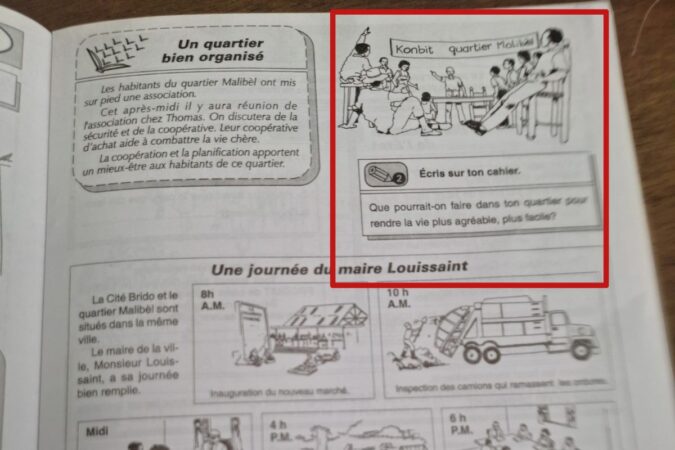
Association meeting scenes, with distinctly male participation.
“These illustrations reflect the underrepresentation of women in associations,” explains Gourgues.
In « À la rencontre de la grammaire » by the Brothers of Christian Instruction (FIC) collection, a scene shows a classroom with 6 boys and 1 girl.
For education specialists, these illustrations reflect the invisibility of women in Haitian society.
Further on, two visuals, one describes a bathroom and its components as well as a man brushing his teeth. While the other shows a kitchen, utensils, and a woman cleaning.
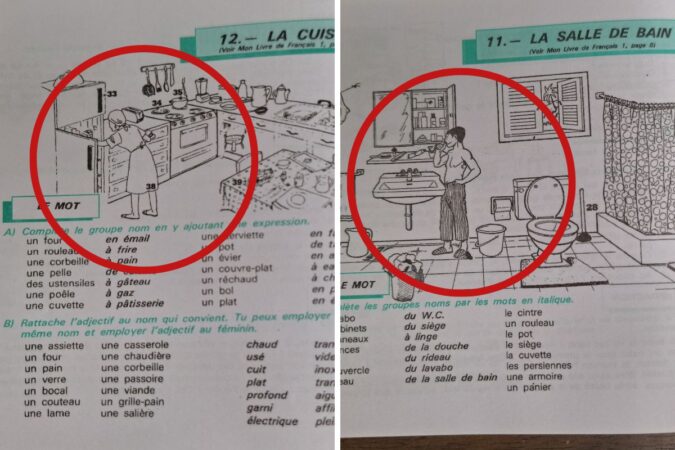
Two visuals, one describes a bathroom and its components as well as a man brushing his teeth. While the other shows a kitchen, utensils, and a woman cleaning.
These works also contain sentences full of clichés.
This is the case with the phrases, “Boys are more intelligent than girls. Girls are more dedicated than boys,” written in « Moi, mes droits et mes devoirs, » on page 15.
Or this sentence taken from « Pour Lire avec Plaisir 2″ on page 58, “The girls are afraid of being seen as cowards, they no longer say anything and follow the boys.”
Comments resembling discrimination are also listed in « Nous les enfants d’aujourd’hui, » on page 5: “I’m ashamed of Grann Yaya, said Mimi. She doesn’t know how to read or write.”
It should also be noted that certain texts from fables or songs used at the nursery and elementary level contain sexist elements.
There are these verses from the Jean de La Fontaine’s fable, “The Milkmaid and Her Pail” in the book « Fables de La Fontaine: 1ᵉʳ, 2ᵉ, 3ᵉ cycles fondamentaux » published by Henri Deschamps.
“The milk is falling: Adieu cow, calf, pig, chicken, all the rest. She left with tearful eye her fortune lost, [Off to her husband to apologize].”
Or the words of this French nursery rhyme, sung in nursery school “a little guy no bigger than a rat [Who beat his wife like a scoundrel]. By saying, Madam, this will teach you to eat apples when I’m not there! »
It is common to observe, in books, male characters as the subject of verbs such as: work, make, repair, direct, etc.
Whereas, those like chatting, cooking, washing largely have feminine subjects.
“These textbooks are witnesses to the evolution of society,” believes an education specialist with the United Nations Educational, Scientific and Cultural Organization (UNESCO), on condition of anonymity.
The cultural models put forth by school, church, family, and neighborhood groups can shape children’s personalities, he adds.
At the MENFP level, the Curriculum and Quality Department (DCQ) is responsible for approving teaching and learning materials, and establishes specific criteria for authorizing a work from a publishing house.
After submitting the work, the DCQ evaluates it then submits an evaluation report to the publishing house, which submits a final version after correction, to be approved.
However, the MENFP is unable to constrain the use of unauthorized works, imbued with sexist stereotypes or racist representations in schools.
“The ministry is unable to evaluate all the textbooks that are in circulation in schools,” says a manager from the Quality Control Department (DCQ) of the MENFP.
A quality control that escapes the MENFP, “for lack of financial and human resources”.
This article has been updated to include only the publishing house mentionned in the section analyzed by AyiboPost.
February 14, 2025, at 12:34 pm.
Cover image: Two children reading a book.| ©Unicef
► AyiboPost is dedicated to providing accurate information. If you notice any mistake or error, please inform us at the following address : hey@ayibopost.com
Keep in touch with AyiboPost via:
► Our Channel Telegram : Click here
► Our Channel WhatsApp : Click here
► Our Community WhatsApp : Click here







Comments